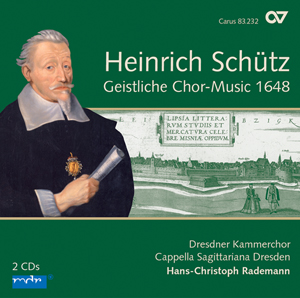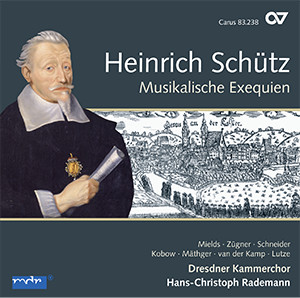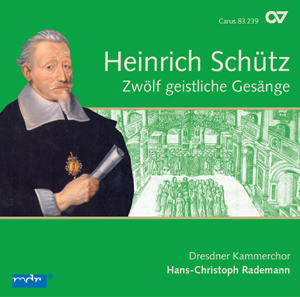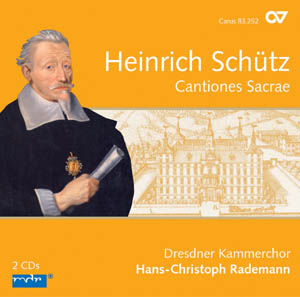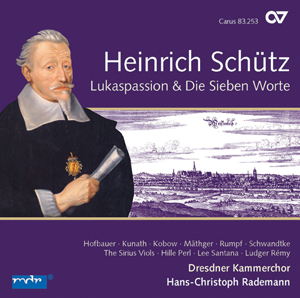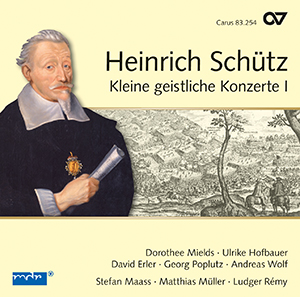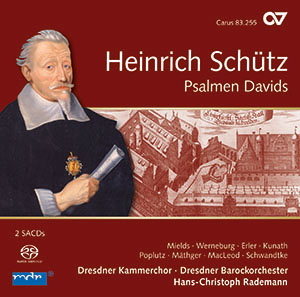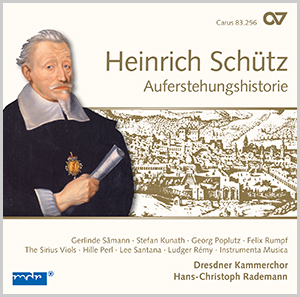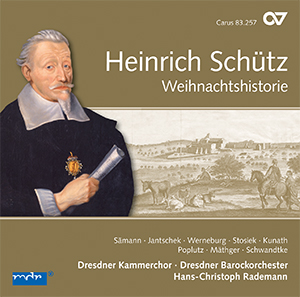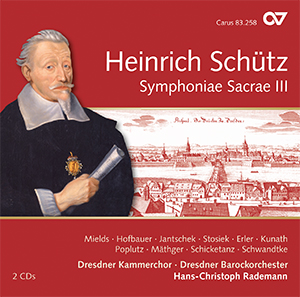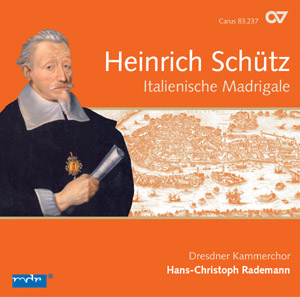
Italienische Madrigale. Complete recording, Vol. 2 (Rademann)
Sommaire
-
Compositeur
Heinrich Schütz
| 1585-1672Heinrich Schütz is regarded as the first German musician of European stature. As a choirboy from 1599 at the court of Landgrave Moritz of Hessen-Kassel, he received a thorough education. In 1608 he began a law degree in Marburg, but broke this off in 1609 in order, with the support of the Landgrave, to study composition with Giovanni Gabrieli, organist at St Mark’s in Venice. In 1613 Schütz returned to Kassel, but two years later was enticed away by Elector Johann Georg I of Saxony to the Dresden court as “Organist und Director der Musica”, where he held the position of Hofkapellmeister (court Kapellmeister) from 1617 until his death. Schütz’s great cycles of vocal works marked the high point of his reputation in Germany and northern Europe. But these represent only part of Schütz’s output; individual works are represented in printed collections with works by other composers, others only survive in manuscript, and much has been lost. The Stuttgart Schütz Edition makes available Schütz’s complete oeuvre, and all works are also published in practical Urtext editions. Plus d'information sur la personne
-
L'auteur de l'avant-propos
Oliver Geisler
-
Chœur
Dresdner Kammerchor
Le Dresdner Kammerchor (Chœur de chambre de Dresde) – l’un des meilleurs chœurs d’Allemagne – est bien connu pour sa sonorité unique, faite d’une grande intensité et clarté. Rayonnement dynamique, homogénéité et transparence sonores souvent cités en exemple sont les points forts de cet ensemble demandé au niveau international. Le chœur a été créé en 1985 par Hans-Christoph Rademann et des étudiants du Conservatoire de musique « Carl Maria von Weber » de Dresde. De nombreuses tournées de concerts ont établi la notoriété de l’ensemble également hors d’Europe. En ont résulté des invitations régulières à d’importants festivals internationaux. Le répertoire du chœur va de la musique de la Renaissance à des compositions du 21ème siècle. Des interprétations de la musique chorale romantique et contemporaine ont été récompensées de prix spéciaux lors de concours internationaux, ainsi que du prix d’encouragement de la fondation Ernst von Siemens. En dehors de la pratique a cappella, le chœur de chambre se consacre intensément à la coopération avec le Dresdner Barockorchester et l’ensemble « Alte Musik Dresden », donnant des impulsions importantes à la pratique de la musique ancienne en Saxe. Une foule d’enregistrements pour la radio et pour le CD, ainsi que la coopération avec des orchestres allemands et étrangers viennent renforcer la renommée du Chœur de chambre de Dresde. Le CD paru aux Editions Carus de Stuttgart, avec le premier enregistrement mondial du Requiem en mi bémol majeur de Johann Adolf Hasse s’est vu décerner le prix de la Critique allemand du disque. Plus d'information sur la personne
-
Chef d'orchestre
Hans-Christoph Rademann
| 1965Conductor Hans-Christoph Rademann is an immensely versatile artist with a broad repertoire who devotes himself with equal passion and expertise both to the performance and rediscovery of early music and to the first performances and cultivation of Contemporary Music. Born in Dresden and raised in the Erzgebirge mountains, he was influenced at an early age by the great Central German kantorial and musical tradition. He was a student at the traditional Kreuzgymnasium, a member of the famous Kreuzchor, and studied choral and orchestral conducting at the Carl Maria von Weber University of Music in Dresden. During his studies, he founded the Dresdner Kammerchor and formed it into a top international choir which is still under his direction today. Since 2013, Hans-Christoph Rademann has been the academy director of the International Bach Academy Stuttgart. He regularly collaborates with leading choirs and ensembles of the international music scene. From 1999 to 2004 he was chief conductor of the NDR Choir and from 2007 to 2015 chief conductor of the RIAS Chamber Choir. Guest conducting engagements have led and continue to lead him to the Nederlandse Bachvereniging, the Collegium Vocale Gent, the Akademie für Alte Musik, the Freiburger Barockorchester, the Deutsche Radiophilharmonie Saarbrücken Kaiserslautern, the Sinfonieorchester Basel, the Orchestre Philharmonique de Luxembourg, among others. Hans-Christoph Rademann has been awarded prizes and honors for his artistic work, including the Johann Walter Plaque of the Saxon Music Council (2014), the Saxon Constitutional Medal (2008), the Sponsorship Prize as well as the Art Prize of the state capital Dresden (1994 and 2014 respectively). He received the Preis der Deutschen Schallplattenkritik several times for his numerous CD recordings (most recently in 2016), as well as the Grand Prix du Disque (2002), the Diapason d’Or (2006 & 2011), the CHOC de l’année 2011 and the Best Baroque Vocal Award 2014. In 2016 he was awarded the European Church Music Prize of the city of Schwäbisch Gmünd. His exemplary interpretation and recording of the complete works of Heinrich Schütz with the Dresdner Kammerchor in the Stuttgart Carus-Verlag, which was completed in 2019, was awarded the newly endowed Heinrich Schütz Prize as well as the OPUS KLASSIK 2020 in the same year. Hans-Christoph Rademann is professor of choral conducting at the Carl Maria von Weber University of Music in Dresden. He is also artistic director of the Musikfest Erzgebirge, ambassador of the Erzgebirge and patron of the Christian Hospice Service Dresden. Plus d'information sur la personne
Critiques
… Under the direction of Hans-Christoph Rademann, the singing of the Dresdner Kammerchor is beautifully balanced, stylish, poised and intelligent.
(Nigel Simeone, International Record Review, September 2011)
… Rademann und sein Chor haben ganz am Anfang der im Entstehen begriffenen Gesamteinspielung ihre interpretatorisch vielleicht größte Herausforderung sehr überzeugend bestanden – denn wer wollte angesichts der Qualität der schon verfügbaren Interpretation der Geistlichen Chormusik von 1648 daran zweifeln, dass die anderen großen Sammlungen aus Schütz’ späteren Schaffensphasen bei diesen Interpreten in besten Händen sein werden? Man darf daher auf den Fortgang des Projekts gespannt sein und mit berechtigter Hoffnung bemerkenswerte Ergebnisse erwarten.
(Dr. Matthias Lange, www.klassik.com, 22. April 2011)
Eine gelungene Überraschung ist diese Aufnahme der italienischen Madrigale, die Hans-Christoph Rademann in seiner Schütz-Edition vorlegt! In vollem Chorklang erscheint das op. 1 aus dem Jahre 1611, das sonst in solistischer Besetzung zu hören ist. Mit diesem Kunstgriff gelingt es Rademann sehr überzeugend, etwas vom Klang des späteren Schütz bereits in diesen Madrigalen zu finden. Wie er es in seiner Interpretation auch schafft, hinter dem typischen Tonfall der italienischen Madrigale immer wieder die Schützsche Rhetorik zum Vorschein zu bringen. Eine Aufnahme, in der die italienischen Madrigale nach Schütz klingen! Und das ist keine Kleinigkeit.
(Dr. Klemens Hippel, concerti, Mai 2011)
Das Dresdner Ensemble agiert … mit allerfeinster Gesangskultur: das klingt wunderbar kultiviert, absolut sauber und zu jedem Zeitpunkt transparent. Und es macht unglaublich Lust auf die nächsten CDs dieser Gesamteinspielung.
(Frank Pommer, Die Rheinpfalz, 19. März 2011)
Der Dresdner Kammerchor kredenzt [die Italienischen Madrigale] unter seinem Gründer und Chef Hans-Christoph Rademann … sehr leicht, schlank und lebendig. Nicht nur das HÖhenleuchten der Soprangruppe nimmt für sich ein. Für den Chor und seinen Dirigenten eine attraktive Station innerhalb der Schütz-Gesamteinspielung bei Carus.
(Johannes Adam, Badische Zeitung, 3. März 2012)
Um als Hörer tief in diese Musik vordringen zu können, sind sinnlich betörende, flexibel den Klang modellierende Aufführungen nötig. Solche liefert unangestrengt vollendet der Dirigent Hans-Christoph Rademann und sein Dresdner Kammerchor, den er ein paar Jahre vor der Wende gegründet hat. Jetzt haben sie mit der „Geistlichen Chor-Musik” und den „Italienischen Madrigalen” bei Carus eine Schütz-Gesamteinspielung begonnen – ein betörendes Unternehmen, das Farbigkeit, Agilität, Wärme über strukturelle Strenge stellt.
(Reinhard Brembeck, Süddeutsche Zeitung, 02. März 2011)
Questions fréquentes sur l'œuvre
 Il n'y a pas encore de questions et réponses concernant cette œuvre ou vous n'avez pas trouvé la réponse à votre question sur l'œuvre ? Cliquez ici et envoyez votre question spécifique à notre service clients.
Il n'y a pas encore de questions et réponses concernant cette œuvre ou vous n'avez pas trouvé la réponse à votre question sur l'œuvre ? Cliquez ici et envoyez votre question spécifique à notre service clients.




